*The man with the spike in his head in E.L. Doctorow’s The March.
*The stolen stocking and “The Exact Reminiscences of Emma Ruth Ross” in Karen Fisher’s A Sudden Country.
*The plague of locusts in Lloyd Zimpel’s A Season of Fire & Ice:
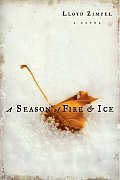 “The first of our visitors descend, no more than we might see on a normal summer’s day. They gaily leap, not so much flying as gliding for great distance: another leap, another glide. But behind these few scouts, the cloud unfolds, expands, becomes black as prairie smoke, as massive as the throngs of pigeons I have seen back East, spreads itself down on us; a crashing deluge, like buckets of hail crackling down. We have not finished tying cords around our sleeves and pants cuffs before they seethe over us, clinging for an instant and dropping away. The cowhides go thick with them, in overlapping layers, those on top covering those beneath, and another layer smothering those. Ma’s quilts seem to change colors as the insects swarm across.”
“The first of our visitors descend, no more than we might see on a normal summer’s day. They gaily leap, not so much flying as gliding for great distance: another leap, another glide. But behind these few scouts, the cloud unfolds, expands, becomes black as prairie smoke, as massive as the throngs of pigeons I have seen back East, spreads itself down on us; a crashing deluge, like buckets of hail crackling down. We have not finished tying cords around our sleeves and pants cuffs before they seethe over us, clinging for an instant and dropping away. The cowhides go thick with them, in overlapping layers, those on top covering those beneath, and another layer smothering those. Ma’s quilts seem to change colors as the insects swarm across.”
*Moths trapped in the muslin skirts of female harvesters in Thomas Hardy’s Tess of the D’Urbervilles.
*The disenfranchised Major and his wife in Henry James’ hilarious and heart-rending story “The Real Thing.”
*Friedrich Nietzsche sharing a rowboat with his boyhood self in Lance Olsen’s Nietzsche’s Kisses.
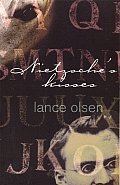 *The Butler Stevens’ aim for greatness in Kazuo Ishiguro’s Remains of the Day.
*The Butler Stevens’ aim for greatness in Kazuo Ishiguro’s Remains of the Day.
*The gentle kindness shown by Edgar Degas to a dying Lydia Cassatt in Harriet Scott Chessman’s Lydia Cassatt Reading the Morning Paper: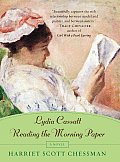 “ “How do you know you don’t?” he asks with quick urgency, his voice low. “How do you know you don’t labor towards something? You seem like one who must know about such effort.”
“ “How do you know you don’t?” he asks with quick urgency, his voice low. “How do you know you don’t labor towards something? You seem like one who must know about such effort.”
“I’m dying.”
“Oui. I know.”
“And I haven’t created anything. I have nothing to leave behind me.”
“But you allow yourself to be in the picture.” "
*Sylvia Plath’s hallucinatory dream sequence in the chapter, ‘Death & Co,’ in Kate Moses’ Wintering:
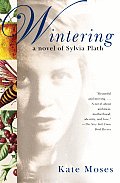 “The line goes emphatically dead, blood bursting like a tomato out of the receiver, wetting her ear. She holds the phone away, horrified, as worms begin to rice out of the mouthpiece, flabby and flaccid, flapping in unison: pink fringe.”
“The line goes emphatically dead, blood bursting like a tomato out of the receiver, wetting her ear. She holds the phone away, horrified, as worms begin to rice out of the mouthpiece, flabby and flaccid, flapping in unison: pink fringe.”
*The sinister bathtub in Kassten Alonso’s Core. 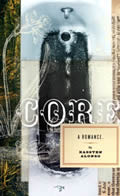
*The slow, savored soulfood meal administered by a black man of God to a reluctant and nihilistic white professor in Cormac McCarthy’s The Sunset Limited.
*The discovery by father and son of an old derelict diesel train long since stopped in its tracks in Cormac McCarthy’s The Road:
“They pushed into the cab and he blew away the ash from the engineer’s seat and put the boy at the controls. The controls were very simple. Little to do but push the throttle level forward. He made train noises and diesel horn noises but he wasn’t sure what these might mean to the boy. After a while they just looked out through the silted glass to where the track curved away in the waste of weeds. If they saw different worlds what they knew was the same. That the train would sit there slowly decomposing for all eternity and that no train would ever run again.”
*The inescapable nature of Barney in Adam Gopnik’s Paris to the Moon.
*Tonio’s lack of a passport, and his sole evidence of identity being proof sheets that bear his name in Thomas Mann’s Tonio Kröger.
*The entire intimate and sweeping tale of William Boyd’s Any Human Heart.
*The two drowned horses in Ivan Doig’s Dancing at the Rascal Fair.
*A troubled young man’s obsession with the mathematical question of imaginary numbers in Robert Musil’s Young Törless.
*The concentration camp scenes in reverse in Martin Amis’ Time’s Arrow.
*The house cut in half and rafted downriver in Jake Hawkes’ story, “Salvage” in Glimmer Train issue #61 (winter 2007)
 *The umbrella-powered rowboat as a means of escape from Italy to Switzerland in Ernest Hemingway’s A Farewell to Arms.
*The umbrella-powered rowboat as a means of escape from Italy to Switzerland in Ernest Hemingway’s A Farewell to Arms.
*The haunting passivity of Europeans during the Nazi rise to power in Mareille Marokvia’s Sins of the Innocent.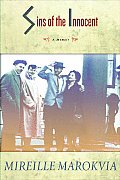
*Kellie Wells’ fabulous essay “Skirls and Skreaks: About Style and my Abiding Affection for Stanley Elkin” at the litblog co-op:
"This was, as I said, the era of minimalism, dirty (and otherwise) realism, and a lot of time was spent discussing the merits of letting a simple story tell itself, a story about the workaday travails of everyday people, spoken in a wallflower language that wouldn't draw attention to itself and certainly in a voice free of the falsifying adornment of free-wheeling, swaggering, rococo verbiage. There were two of us linguistic delinquents in that workshop at whom this weekly catechism was aimed and we politely listened to the tutorial, but despite the ongoing efforts of these earnest reformers to rein in our most unforgiving excesses, to purify our polluted aesthetics, we remained recalicitrant heathens to the end."

No comments:
Post a Comment